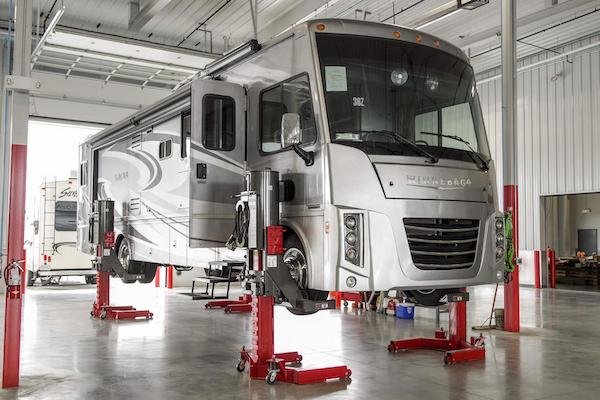RV Insurance Cost in 2024
Before hitting the road with your camper, it’s important to make sure you and your rig are protected. Even if you are stationary or storing your RV, you still want to make sure to have proper coverage and the best RV insurance for you.
How much does RV insurance cost?
The cost of RV insurance depends on several factors including the type of RV, its value, driving history, location, coverage options, and more. On average, RV insurance can cost anywhere from a few hundred to a few thousand dollars per year. On average, plan on spending $500 to $3,000 each year.
The type of RV you have can affect the cost of your insurance. Larger, luxury RVs will typically cost more to insure than smaller, more basic models. The value of your RV also plays a role in determining the cost of your insurance. The higher the value of your RV, the more expensive it will be to insure.
Your driving record and location can also impact the cost of your RV insurance. If you have a history of accidents or moving violations, your insurance premiums will likely be higher. The location where you park your RV and the places you take it can also affect the cost of your insurance. If you frequently travel to high-risk areas, your insurance premiums may be higher.
When it comes to coverage options, you have a number of choices, including liability coverage, collision coverage, comprehensive coverage, and more. The more coverage you choose, the higher your insurance premium will be. It is important to consider your individual needs and budget when selecting coverage options for your RV.
Travel Trailer Insurance Cost
On average, the cost of insuring a travel trailer ranges from $300 to $1,000 per year. The cost of insurance can be higher for larger and more expensive trailers, as well as for those with extensive features and amenities. The coverage type also affects the cost of insurance, with comprehensive coverage typically being more expensive than liability only coverage. The location where the trailer is stored and used also plays a role in the cost of insurance, with rates being higher in areas with higher risks of theft, accidents, or natural disasters. A person's driving history and the type of vehicle used to tow the trailer can also impact the cost of insurance.
Camper Van Insurance Cost
The average cost of camper van insurance can vary depending on several factors such as the type of vehicle, the driver's age and driving history, location, and coverage options. However, on average, a full-time camper insurance policy can cost anywhere from $1,500 to $3,000 per year.
If you only use your camper van part-time, you may be able to get a cheaper policy. For example, some insurance companies offer policies for recreational vehicles that are only used for camping or road trips. These policies can cost as little as $500 per year.
In general, older and more experienced drivers tend to pay less for camper van insurance than younger and less experienced drivers. Additionally, drivers with a clean driving record are typically eligible for lower rates than drivers with a history of accidents or violations.
The location where you store your camper van and the type of coverage you choose can also impact your insurance premium.
Fifthwheel Insurance Cost
On average, fifth wheel insurance can range anywhere from $500 to $2,500 per year. To get a more accurate estimate of fifth wheel insurance costs, it's recommended to get quotes from multiple insurance providers. These quotes should consider the specific needs and coverage preferences of the owner. Factors that can impact the cost of fifth wheel insurance include; the age and value of the fifth wheel, the type of coverage selected (e.g. liability, comprehensive, collision, etc., the location where the fifth wheel will be stored and used, the driving history of the owner, the deductible amount selected, and the type of use (e.g. personal, RV rental, etc.) It's also important to consider additional factors such as the insurance company's financial stability and customer service record.
Class A Motorhome Insurance Cost
The average cost of class A motorhome insurance is between $1,000 to $2,500 per year. However, luxury models with higher value can cost significantly more to insure.
Several factors that can impact the cost of insurance include: The type of motorhome, the make and model of the motorhome can affect the insurance cost, as some models may be more expensive to repair or replace. Age, older motorhomes tend to have lower insurance premiums, as they are typically worth less than newer models. Driving history, if you have a history of accidents or traffic violations, your insurance premium may be higher. Location, insurance rates can vary by state, with some states having higher rates due to increased accident rates or higher theft rates. Coverage the amount of coverage you choose will also impact the cost of insurance, as a higher level of coverage will generally result in a higher premium.
Get a Quote on RV Insurance
The only way to know the cost of insurance for you is to get a quote. Many insurance providers offer free quotes to help determine the best option for you.
What factors influence the cost of RV insurance?
RV insurance premiums can vary significantly based on the diverse range of RV types and classes, along with the typical components that impact the cost of motor vehicle insurance. Several key factors contribute to the fluctuation in RV insurance rates:
Type, Age, and Condition
Motorhomes generally incur higher insurance costs compared to travel trailers due to the need for RV liability coverage when the vehicle is driven. State-of-the-art motorhomes also tend to have higher replacement costs than trailers, pop-up campers, truck campers, and fifth wheel trailers. For instance, a class A motorhome, being the largest RV type, typically commands a higher insurance premium compared to smaller class C motorhomes or class B camper vans. The age and condition of the RV also play a role, with newer, luxurious motorhomes costing more to insure than older utility trailers.
Usage
The purpose for which you use your RV influences insurance costs. If your RV serves as your permanent residence for six or more months each year, additional coverages similar to homeowners insurance may be necessary, covering personal liability, medical payments, and loss assessment. Recreational use also factors in, with some insurers adjusting premiums based on the frequency of use.
Location
Similar to auto insurance, the geographical location impacts RV insurance rates. High-population areas and regions prone to severe weather or higher rates of motor vehicle theft tend to have higher insurance costs for RVs.
Coverage Selection
Financing arrangements can affect coverage requirements, with lenders often mandating comprehensive and collision coverage for financed RVs. Adjusting coverage options, such as eliminating physical damage coverages for fully paid motorhomes, can impact the policy price. Additional coverages like roadside assistance, vacation liability, and total loss replacement contribute to increased insurance costs.
Driving Experience
Experienced RV operators typically pay lower insurance premiums than inexperienced drivers, given the distinct driving challenges posed by handling larger vehicles or towing trailers.
Driving Record
Insurance companies consider your driving record when pricing RV policies. A clean driving record can result in more competitive rates and potential discounts.
Claims History
While RV insurance is designed for use in case of damage or accidents, a history of frequent claims may lead insurers to perceive you as a higher risk. Drivers with a track record of insurance claims often face higher RV insurance premiums.
Is RV insurance cheaper than auto insurance?
The cost of RV insurance compared to auto insurance can vary and may not always be cheaper. It depends on several factors such as the type of RV, its value, driving history, location, coverage options, and more.
The type of RV you own can greatly impact the cost of your insurance. Larger, luxury RVs will typically cost more to insure than smaller, more basic models. The value of your RV also plays a role in determining the cost of your insurance. The higher the value of your RV, the more expensive it will be to insure.
Your driving record is also a factor that can impact the cost of your RV insurance. If you have a history of accidents or moving violations, your insurance premiums will likely be higher. On the other hand, if you have a clean driving record, your insurance premiums may be lower.
The location where you park your RV and the places you take it can also affect the cost of your insurance. If you frequently travel to high-risk areas, your insurance premiums may be higher.
When it comes to coverage options, you have a number of choices, including liability coverage, collision coverage, comprehensive coverage, and more. The more coverage you choose, the higher your insurance premium will be. It is important to consider your individual needs and budget when selecting coverage options for your RV.
When comparing RV insurance to auto insurance, it is important to consider that auto insurance is typically required by law for personal vehicles used for transportation purposes, while RV insurance is not always mandatory. Auto insurance may be cheaper if the vehicle is used primarily for personal transportation and not for recreational purposes.
This page contains affiliate links. That means we earn a small commission if you make a purchase through a link on this page. There is no additional cost to you. Thank you for your support!


